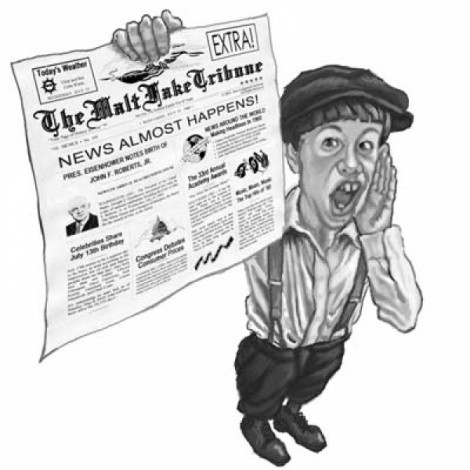
Forget breaking news; now we have News That Never Happened. If you are one of the diehards out there who still peruses a daily newspaper, you might have seen the headline on the front page of the March 28 edition of the Shit Lake Tribune: “Fugitive Nearly Went Out in ‘Blaze of Glory.’”
Already the journalistic community is hailing this revolutionary breakthrough in the newspaper business. Roy Gleason Frobisher, ombudsman-in-chief and holder of the Leonard Monboddo Chair in Futurology at the respected Poynter Institute, has been blogging night and day about the Tribune’s groundbreaking innovation.
“Just when it looked like newspapers would be packing it in for good, the geniuses out in Salt Lake have, in one brilliant stroke, changed the news business as we know it. Whether you call it News That Never Happened, Counter-Factual News Coverage, or, as some fancy pundits have termed it, Hypothetical News, it is a godsend of the first order. The implications are staggering.”
Professor Frobisher acknowledged that there is still some dispute as to whether the Tribune’s revolutionary invention was a stroke of genius, or just a bonehead mistake.
“You know, it doesn’t really matter,” said the distinguished ombudsman. “Who was it, Benjamin Franklin or maybe it was George Washington Carver, who discovered penicillin by mistake when he left a half-used can of tuna on the kitchen counter overnight? Same thing here. Whatever the intention, the newspaper business now looks brighter than ever. “For centuries, we ink-stained wretches have been constrained by real events. We do things wrong all the time, but our basic premise was reporting facts, you know, all the news that fit to print, and that sort of thing.
It never occurred to anyone to take what I like to call the ‘hypothetical leap.’ It doesn’t matter anymore what happened. Now the key driver is what might have happened, and the key word is nearly.
“By the way, I want to make clear that nearly news is different from fake news, which is actually a commentary and critique of real news. It takes some effort, while news that never happened is brainless. That’s the beauty of it.”
Professor Frobisher has already issued a pamphlet (available online at NearlyNews.net) to help practitioners of news that never happened to get started. He urges neophytes to take a whack at crafting hypothetical headlines from the past before attempting to enter the contemporary nearly-news market.
Here are some of Professor Frobisher’s hypothetical headlines from the past: “Noah Nearly Drowns in Huge Flood”; “Jesus Nearly Escapes Excruciating Crucifixion”; “Luigi Columbus Nearly Discovers America”; “Nephi Nearly Loses Head in Sword Battle With Laban”; “Earth Nearly Spins Out of Orbit”; “Mitt Nearly Becomes President”; “Dogs Nearly Gifted With Speech by Almighty God”; “City Weekly Columnist Nearly Nails Madonna.”
Of course, hypothetical news is, by definition, backward looking in that the practitioner must posit, subjunctively, something that might have happened, but clearly did not happen, as in “Tribune Reporter Nearly Uses Brain.” But Professor Frobisher points out that a subbranch of news-that-never-happened encourages the practitioner to look to the future.
“As a futurologist, I’m particularly excited by what I call the future subjunc tive maneuver. I don’t think anyone could ever surpass this maneuver as employed by the Tribune reporter, I forgot the name, in the article under the headline we have been discussing, namely, “Fugitive Nearly Went Out in a Blaze of Glory.” Let me quote the lede, which I recommend budding subjunctive journalists to emblazon in their brains: “No one could know what might lie ahead that Indian summer afternoon in 2007 as Larkin Baggett stood before a federal judge in Salt Lake City.” Professor Frobisher paused to shake his head in wonderment.
“Where to start? This statement leaves the annoying inanity of your average ‘anecdotal lead’ totally in the dust. No one could know what might lie ahead! I love this! A moment’s thought will tell you that no one ever knows what might lie ahead.
And the thudding portentousness of the assertion, along with the wonderful ‘that Indian summer afternoon,’ will probably induce in stupefied readers the conclusion that they are reading a C-minus mood piece for a high school creativewriting assignment.
“Nevertheless, we finally have the universal formula for a news story that ‘writes itself.’ Try it yourself! You could never know what might lie ahead that Indian summer afternoon or bone-chilling winter evening or blustery spring afternoon when you began to read the nearly news story and then tossed the paper into the recycling bin.”